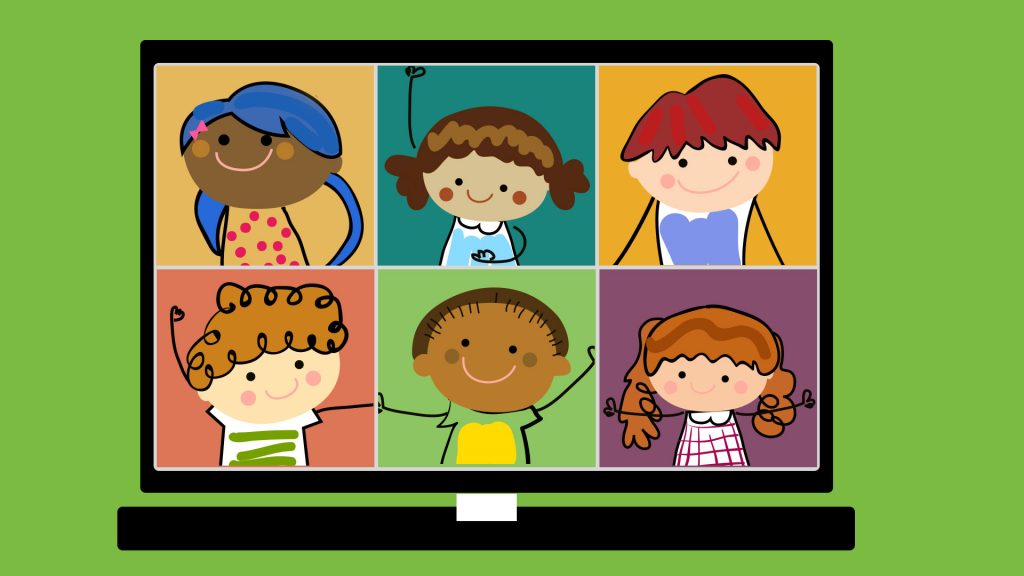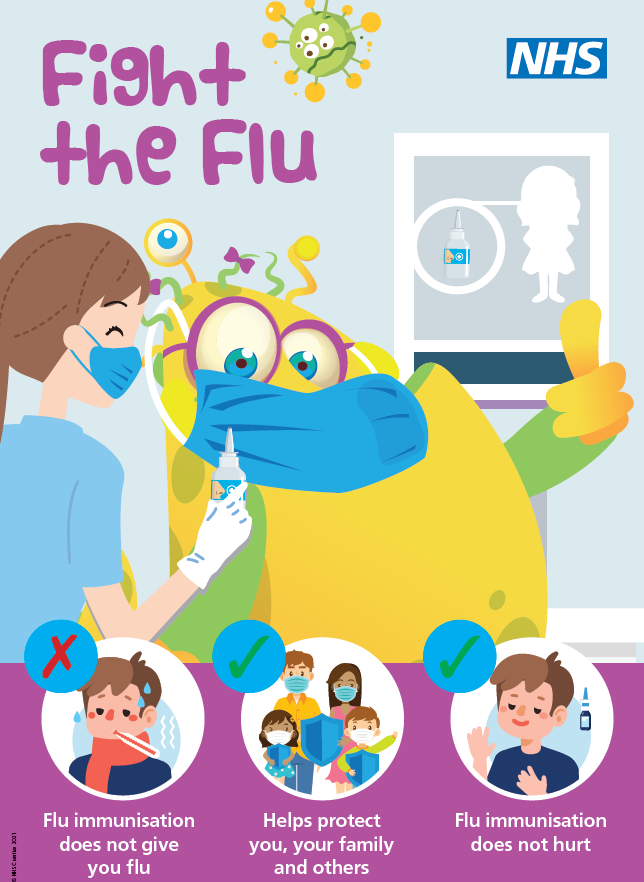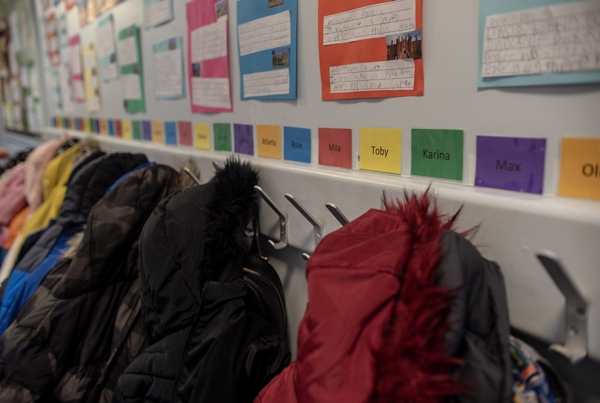Remote Learning

Purpose of the Plan
This plan outlines the actions the school will take to provide remote education under the following circumstances:
- Where a class or bubble need to self-isolate following a confirmed case of COVID
- Where more than one class or bubble across the school need to self-isolate following a confirmed case of COVID
- Where we are in a National lockdown and are only open to ‘critical’ worker children
For pupils with an EHC plan, a separate plan will be written in line with their IEP targets if any of the above circumstances occur to ensure that provision and needs are met as much as possible.
Aims
- To ensure Norris Bank Primary School have a plan that can be up and running as soon as possible should a need arise to educate a class/ bubble of pupils off site
- To support our pupils to continue to receive the best teaching and learning we can facilitate under these difficult conditions and to minimise lost learning as much as possible
- To provide a ‘learning at home’ timetable which balances an expectation of 3-4 hours of work per day (KS2), 2-3 hours (KS1), and 1-2 hours (EYFS) with flexibility and the need to respect difficulties parents may have in supervising and supporting this expectation
- To ensure consistency in the approach to remote learning for pupils who are not in school.
- To keep the model as simple as possible to ensure that pupils, parents/carers and teachers know what is being asked of them and to ensure all involved are trained in their use
- To ensure that maximum teaching and learning is maintained between teachers and pupils at home through a range of methods including: Google Classroom, ClassDojo, educational websites, Google Meet and our interactive platform
- To ensure that our remote teaching allows interaction, assessment and feedback to take place using high quality remote education resources.
- To ensure that interaction and relationships with our children are fundamental to our wellbeing and GROW values
- That all staff are committed to the emotional and pastoral connection and support of all our pupils whilst they are learning from home
- To provide printed resource packs, for pupils who do not have suitable online access
Anticipated challenges and how we can respond
- Remote education for younger children will typically need more involvement from parents, and parents may be facing a range of pressures at this time. We will be flexible and supportive and will be available for parental general queries and specific learning support as appropriate. With the older pupils, teachers will develop pupils’ sense of autonomy and self-management through their planned lessons, videos, dojo, Google classroom and through task design.
- Maintaining engagement from pupils. Teachers will make good use of opportunities within lessons and teaching to set clear expectations for work submitted and to provide encouragement and celebration
- Supporting those pupils who usually rely on a high level of support in class. Teachers will provide differentiated work where appropriate – especially those children with SEND. Additional resources may be available to these children to allow them to slow learning down to a more manageable pace. Direction of TA’s will also be used to support learners
- The demand on technological devices in the home may be stretched if more than one pupil in a home is needing to use a device at the same time. Timetables will need to recognise such demands and will be adapted accordingly, particularly in the event of a tier 4 lockdown (school is closed for all pupils except priority groups). Additional devices that the school can access via the DfE will also be deployed on a needs basis. Pre-recorded lessons will also support working parents and those with other children
Teaching and Organisation
Set work: general guidance
Your child’s teacher will:
- Set work in order that pupils have meaningful and ambitious work in reading (including phonics) writing and GPS, maths, creative curriculum, science and wellbeing as well as keeping active
- Encourage their class about the importance of having a work routine and the expectations of completing work every day. Perseverance and ‘having a go’ with tricky learning will also be emphasised and encouraged
- Plan a programme that is a good way towards the equivalent length to the core teaching pupils would receive in school
- Continue to teach a planned and well-sequenced curriculum so that knowledge and skills are built incrementally, with a good level of clarity about what is intended to be taught and practised in each subject
- Provide frequent, clear explanations of new content
Set work: specific guidance
Reception: daily expectations: 1-2 hours
A blend of interactive, work sheet and independent learning as well as links to appropriate educational websites and videos. Learning to cover a daily phonics/reading/writing session by video and maths supported by purple mash and Mathletics. Activities linked to Understanding of the World/ Expressive Art and Design and Physical Development. Daily reading of books from school or from home or online with an adult 10-15 mins. These activities can be accessed via the school VLE on the website as well as the use of ClassDojo.
Key Stage 1: daily expectations: 2-3 hours
A blend of interactive, work sheet and independent learning as well as links to appropriate educational websites and videos. Year 1 & 2 will use ClassDojo as well as the class story element. English such as phonics, reading and writing, math’s and other curriculum subjects will be delivered via google classroom, Purple mash, white rose math’s and other appropriate apps such as Mathletics. Focus on creative curriculum, science, PSHCE and PE To support wellbeing: staff will use a range of strategies including the app ‘explain everything’ which will allow the children to hear their class teacher. Regular check ins/outs with the children will happen Teachers will read to their children. Learning grids covering the topics covered will be able to be accessed via the school website. Daily reading of books from school or from home with an adult 10-15mins.
Key Stage 2: daily expectations: 3-4 hours
A blend of interactive, work sheet and independent learning as well as links to appropriate educational websites and videos. The use of dojo and class story English such as reading, writing, math’s and other curriculum subjects will be delivered via google classroom, Purple mash, white rose math’s and other appropriate apps such as Mathletics, TT Rock stars etc.. Focus on creative curriculum, science, PSHCE and PE Session may include tutorials and online videos. To support wellbeing: staff will use a range of strategies including the apps ‘loom’ and ‘explain everything’ which will allow the children to hear their class teacher. Regular check ins/outs with the children will happen Learning grids covering the topics covered will be able to be accessed via the school website. Weekly PSHCE lesson Weekly PE lessons Independent reading of books from home or from school for 10-15mins Reading lessons throughout the week.
Children with no internet access
Where children do not have internet access at home, a printed pack of resources will be provided at the start of the period of self-isolation.
*All lessons that will be recorded refer to input from their class teacher. This may be audio of them talking through a lesson or demonstrating a piece of learning. These will be uploaded to our VLE to enable flexible use if a pupil/family cannot access it at the given lesson time. We will not be providing ‘Live’ lessons in ‘Real’ time.
- Pre-recorded lessons will be uploaded to google classroom or the schools VLE and will be found on the relevant year group page
- There will be 2/3 lessons each day in KS2 and 1/2 in KS1. The lesson will be available on the VLE to access as frequently as needed
- Pre-recorded lessons will be scheduled for approximately a 9.15am and 1pm start. These will help to mirror the registering of pupils daily
- Teaching sessions will be approximately 45 minutes for KS2 and 30 minutes for KS1. In EYFS, these will be up to 20 minutes in Reception.
- Parents may need to stay with their child during lessons in Reception to Year 2
- Teachers will explain concepts and provide modelling through apps such as ‘explain everything’ or ‘loom’. Pupils will then have the opportunity to practice
- Independent work should then follow for the pupil. During the independent practice time, teachers will be available to answer questions and provide further clarification and feedback
Teaching videos may accompany the lesson coverage each day. A further task outline or pre-recorded teaching video/s or links may be used as and when teachers feel that it will support the learning for the pupils.
- Reading every day for 15-20 minutes will be part of all pupils remote learning programme
- Whilst general class work will be set for most pupils, videos and supporting resources will be included and used for those pupils who need additional teaching and/or those pupils who will require extending and challenging beyond the class lesson
- For those pupils with identified SEND, differentiated activities will be set through the above class process: for individual pupils with an ECHP and who need more personalised learning tasks, these will be provided for by class teachers, SENDCO and LSA’s
- Providing feedback on work. Teachers will continue to offer the high level of support and feedback that was given through the lockdown/Summer term period. Whilst not being expected to feedback on every child’s every piece of work, teachers will assign certain tasks to receiving more feedback than others
- Teachers in Y3 – Y6 will set clear expectations and will check work and make clear to pupils that they will be expected to upload/submit/complete tasks according to the deadlines set. We would ask that parents support their child’s teacher in this by checking in with their child daily that they have done this
- Parents of Reception to Year 2 children will be asked to upload a photo of tasks completed following the lessons to the learning platform
- Use of digital sites. Teachers will continue to use these to support practise and consolidation of core skills
- In KS1 and EYFS, there will be a balance of parent supported activities and independent activities. In the former, parents will be asked to support and aid the learning for their child. This may take the form of a directed task set or supporting with one of the pre-recorded lessons watched. The latter is where the planned activity will be more play/independent based. This is in line with the way the children would be learning in school during continuous provision
- Sharing, celebrating and supporting wellbeing. Work amongst the pupils on the platforms will help to maintain connection, belonging and a sense of accountability to school. Teachers will celebrate individual pupils, share work and maintain the strongest sense of ‘belonging’ and class identity. Google meets will also be arranged to ensure face to face contact and allow children to ‘check-in’ with their teacher and peers and vice versa
- Creative curriculum/Science/PSHCE/PE curriculum/GROW. Teachers will plan activities and learning for the afternoon that will develop any of these aspects. They will be in line with the current learning and be a range of different activities across the week
If we do not have contact with a child through email, work submissions, or Google meets then a member of staff will telephone to ensure they are well and offer any support with home learning.
FAQs
Will my child be taught broadly the same curriculum as they would if they were in school?
We teach the same curriculum remotely as we do in school wherever possible and appropriate. However, we have needed to make some adaptations in some subjects. For example, PE which are normally taught by specialist staff and often require specific resources or equipment.
How long can I expect work set by the school to take my child each day?
We expect that remote education (including remote teaching and independent work) will take pupils broadly the following number of hours each day:
EYFS: 1-2 hours
Key Stage 1: 2-3 hours a day
Key Stage 2: 3- 4 hours a day
If my child does not have digital or online access at home, how will you support them to access remote education?
We recognise that some pupils may not have suitable online access at home. We have a limited number of devices but we aim to issue or lend laptops or tablets to pupils who do not have any access to a device. We will also support access to the internet through those providers supported by the DfE. Please phone school with any queries about devices or internet connection for your child.
Parents can request a copy of the printed resources on a weekly basis which can be collected from the school office. Work from the previous week can be returned to the school office and this will be passed to the class teacher for feedback.
What are your expectations for my child’s engagement and the support that we as parents and carers should provide at home?
We would recommend creating a dedicated area for your child to work on their remote education, where possible. Having a routine is very important and we would encourage your child to follow a timetable that works for you and your family setting. It is also important that pupils exercise and have a break when learning at home. We expect all pupils to engage in their learning where possible as this will be beneficial to their emotional wellbeing and also provides valuable opportunities for their teacher to provide feedback and answer any questions pupils may have about their learning.
How will you check whether my child is engaging with their work and how will I be informed if there are concerns?
Each week, your child’s class teacher will monitor which pupils are accessing, submitting work, or collecting/returning printed resources from the school office.
If we do not hear from a parent or child within a given week, or concerns are raised about your child’s engagement with home learning, you will receive a phone call from a member of the Senior Leadership Team to discuss how we can support you.
Will the school offer live lessons?
Our Remote Education plan has been carefully planned to ensure that we use a variety of remote learning strategies and our provision meets the needs of our whole school community. Many parents prefer the flexibility of pre-recorded lessons as they can be accessed at a time around their work or other commitments. Throughout the school closure, critical worker and vulnerable children in school attendance are accessing the same teaching videos and resources as the children learning at home.
In response to live lessons, we have researched extensively live lessons V’s pre-recorded lessons and which would best suit the vast majority of children at Norris Bank. No research suggests that one is ‘better’ than another. A report from the Education Endowment Foundation points out that the method of delivery is much less important than the quality of that delivery. We have made this decision due to the points below:
- Live lessons amplify the ‘digital divide’, as we have a large number of families who are sharing devices, often with working parents, and cannot log at certain times to access the lessons. We have had many emails from families regarding this especially those with 2 or more children whose parents are trying to home school. In many homes, there aren’t suitable devices for all children to access lessons at the same time
- A large number of our parents are continuing to work from home during lockdown. I have been connected by parents who have praised the pre-recorded lessons as they have tried to change their own work pattern around supporting their children
- Pre-recorded lessons give working parents more flexibility as to when work is completed, taking away some parents anxiety of having to be online at certain times- this we know is one of parent’s top 5 reasons for struggling with their own mental wellbeing during lockdown
- Pre-recorded lessons also mean that pupils can pause, rewind and revisit explanations they have struggled with. This has been shown to especially support children who find some subjects challenging and cannot keep up with the live lesson content
- Giving children feedback, via platforms such as Google Classroom, has allowed teachers at Norris Bank to adjust their planning of lessons to meet the needs of the learners. Our live lessons would be with between 30-45 children at a time. It would therefore be impossible for teachers to give such large groups the feedback they require
- There can also be a problem with the amount of bandwidth streaming that live lessons require, and this often becomes an issue when children are trying to join live lessons at the same time that parents are trying to have virtual meetings.
Our remote education offer also reflects the expectations from the DfE and recommendations from the Education Endowment Foundation and OFSTED.
Department of Education: Remote education good practice
Education Endowment Foundation: Remote learning for pupils
Our school website also lists a range of websites and resources which can be accessed using the following link:


